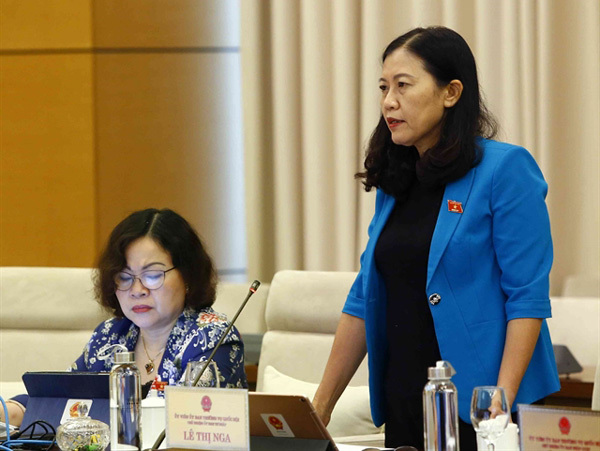 |
| Le Thi Nga, Chairwoman of the National Assembly Judicial Committee, delivered a report on the progress of implementing the 2013 Constitution in the last five years during a National Assemly Standing Committee meeting held on Wednesday. — VNA/VNS Photo Van Diep |
On Wednesday, the top organ of the country’s parliament heard a report from its judicial committee on the implementation of the Constitution in the last five years.
The NA Standing Committee’s members agreed that all Government and parliamentary bodies have been active in directing the efforts to bring the spirit of the Constitution to life, contributing to the many socio-economic achievements that the country has made.
From the beginning of 2014, the NA and NA Standing Committee have adopted more than 111 laws and ordinances, 69 of which are listed in Resolution 718 detailing the action plan to implement the Constitution – including those considered the pillars of the legal system such as the Penal Code or the Civil Code – accounting for 62.12 per cent of all laws passed.
However, by June 2019, there are still 21 laws and ordinances in the resolution that have not yet been worked on or promulgated, with many missing the original completion date by more than two years and risking delays beyond 2020.
NA vice chairman Uong Chu Luu stressed that no further delays are acceptable and there must be a clear roadmap on the promulgation of several laws that are highly relevant to citizens’ rights such as the Law on Association and the Law on Demonstrations, which were supposed to be penned by the Government and submitted to the NA for approval in the 2015-16 period.
NA Secretary General Nguyen Hanh Phuc also pointed out that the parliament itself “owes” the public a constitutional right, which is allowing the constituents to dismiss a NA deputy or a member of the People’s Council that they deem no longer worthy of representing them.
Phung Quoc Hien, NA vice chair, said that while the implementation of the Constitution involves daunting workloads, there are certainly areas that really need to be improved.
“Is it looking possible that all the laws and ordinances in the plan could be finished by 2020, because we only have two more plenary sessions?. If we miss the 2020 mark then what implications might there be that in the last seven years since the adoption of the new Constitution, we have failed to achieve the targets we set out,” Hien said, asking that the Government must clarify the causes for the holdup of the bills.
He also pointed out that while it might not be unconstitutional, many items on the Constitution have not been observed closely.
“For example, the Constitution stipulates that all expenses can only be done once the estimates are approved by the National Assembly and relevant authorities, but in many cases there are no estimates to be found. Is that in line with the spirit of the Constitution?. I believe this issue, among others, needs to be looked into,” Hien added.
Money problems
Chairwoman of the NA Judicial Committee Le Thi Nga said that while the legal framework governing the judicial system has been mostly completed, there are still lingering issues – oftentimes the question of money – that affect the implementation, however.
According to Nga, to uphold human rights and civil rights as enshrined in the country's Constitution, the Criminal Procedure Code clearly stressed the need to record audio and video of an interrogation – not only to produce evidence for investigators and to be used in legal proceedings, but it also serves a way to deter law enforcement’s unlawful uses of torture and forced confessions.
However, Nga said that this regulation has not been implemented in real life, as the public security ministry claimed they don’t have the financial means to build a specialised interrogation room equipped with audio and video recording equipment.
Nga then asked the justice minister to report to the Government on this issue since when the regulations were put in the law, the Government was totally on board.
Financial difficulties were also said to be the reasons leading to many existing problems in the legal system, including a tight operating budget, lack of incentivising policies for judicial personnel and most importantly, insufficient budget to carry out judicial expertise.
Later the same day, NA Standing Committee members discussed reports from the Government, the Supreme People's Court and the Supreme People's Procuracy on the settling of denunciations and complaints.
Denunciations and complaints from citizens were still complex this year, focusing on issues like land, housing, corruption and the environment, although the number of complaints and denunciations cases fell by 7 per cent, according to the reports. Some localities failed to handle denunciations and complaints as they were expected to.
The National Assembly Law Committee instructed ministries, agencies and localities to improve the efficiency of complaint settlement. It was also necessary to increase State management efficiency, particularly in issues of public concern, to restrict the rise of complaints and denunciations.
NA Deputy Chairman Uong Chu Luu pointed to the need to hold more meetings between officials with citizens to enhance the efficiency of complain and denunciation settlement.
VNS
 Several laws and regulations that were supposed to be developed following the enactment of Viet Nam’s 2013 Constitution are still yet to materialise, let alone be ratified, according to the National Assembly (NA) Standing Committee.
Several laws and regulations that were supposed to be developed following the enactment of Viet Nam’s 2013 Constitution are still yet to materialise, let alone be ratified, according to the National Assembly (NA) Standing Committee.